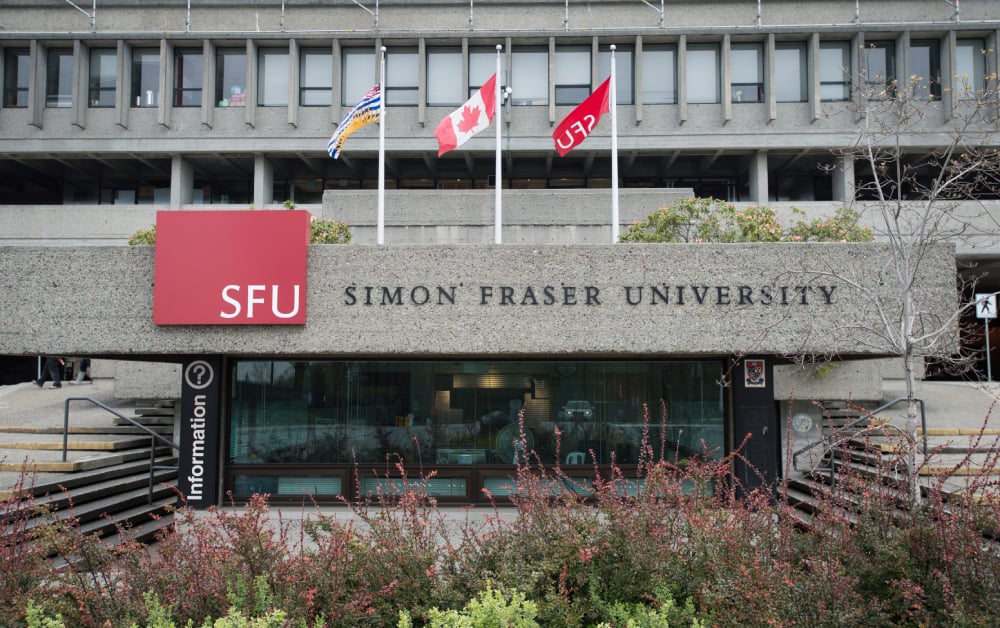Simon Fraser University took another step towards ending anti-Black racism in the university last week by joining more than 40 other Canadian universities in signing onto the Scarborough Charter on Anti-Black Racism and Black Inclusion in Canadian Higher Education.
“All Black members of the SFU community deserve to feel safe and included on our campuses, and we can — and must — take tangible action towards that goal,” said SFU president Joy Johnson in a university press release.
“I’m heartened to see so many institutions making this commitment and excited to see the progress we make together.”
The charter, named for the University of Toronto Scarborough where it was created, was the result of several dialogue sessions on Black equity and inclusion in higher education that were held in 2020, with participation from Black faculty, students and alumni from post-secondary schools across the country.
Simon Fraser University was not represented among the creators of the charter, but both the university’s Black Caucus and members of the Students of Caribbean and African Ancestry student group provided substantial feedback on the initial draft.
“What’s particularly significant is that this is a national charter on anti-Black racism, where universities will have to make action plans and execute them. This will definitely show how specific universities are looking at the charter, and if they are taking it seriously or not,” said Blaqees Jama, SOCA’s president.
While not legally binding, signatories to the charter commit to recognizing that in governance, research, teaching and learning and community engagement, they must:
- Encourage and support Black people and community to flourish;
- Recognize that education excellence is only achieved through inclusive education;
- Foster positive relationships with the Black community in their school and wider community;
- Hold themselves accountable to a long-term implementation of the charter’s goals to support Black students, faculty and staff to thrive.
Commitments in the charter include commissioning and supporting academic research on Canada’s history of slavery, colonialism and racism; creating mentorship and sponsorship opportunities for Black faculty to move into leadership positions; reassessing campus safety and security protocols; and providing anti-Black racism education for every member of the school.
“This is not a legal document, but this is a moral document,” said June Francis, an associate professor in the Beedie School of Business, special advisor to the SFU president on anti-racism and a member of the university’s Black Caucus.
“Any university with integrity that has committed to these things, the burden is heavily upon them to follow through. This is as binding as it gets, short of a court of law.”
Signing the charter follows a recent decision by the SFU senate to pass a student motion to hire at least 15 tenure-track Black faculty members; acknowledge the ongoing impacts of systemic anti-Black racism; and recognize Black History Month and the ongoing United Nations’ International Decade for People of African Descent.
Combined, these moves will push to change the university’s trajectory from a school that values only European research, pedagogy and ideas towards a school that recognizes and affirms the research, teaching methods and philosophies of many cultures, including and especially those of the university’s Black community, Francis said.
“I hope everyone can see how this will create a better place for all of us at the university, and beyond, because of course universities are critical pillars of Canadian society,” she said.
But getting to this point has not been easy for Simon Fraser University’s Black community.
A 2019 Diversity Metre survey of SFU faculty found only 35 per cent of Black faculty members felt valued and heard at the school. Another survey by SOCA of their members in 2021 found 80 per cent of respondents did not think SFU was equipped to handle anti-Black racism on campus.
From 2018 to 2020, SOCA fought with the students’ union to secure a space in the new student union building, despite occupying a student union space on the Burnaby campus for over 20 years.
And following years of complaints from players, students and faculty, SFU finally agreed to change the name of its sports team, the Clan, in 2020 following the death of George Floyd.
“There haven’t been [many] times where I’ve been proud of SFU on the racial equity lens, I’ll be honest with you. It has been a long battle of mostly being embarrassed at the institution,” Francis said.
“But this, I must say, was one of those moments where I felt incredibly affirmed by the fact that SFU was taking leadership by signing up right at the start of this charter.”
Like the Senate’s commitment to hiring more Black tenure-track faculty, implementing the Scarborough charter will require significant funding for both new initiatives and redressing past harms.
The first real test of the university’s commitment to the charter will come when the next university budget arrives in the spring. ![]()
Read more: Rights + Justice, Education

















Tyee Commenting Guidelines
Comments that violate guidelines risk being deleted, and violations may result in a temporary or permanent user ban. Maintain the spirit of good conversation to stay in the discussion.
*Please note The Tyee is not a forum for spreading misinformation about COVID-19, denying its existence or minimizing its risk to public health.
Do:
Do not: